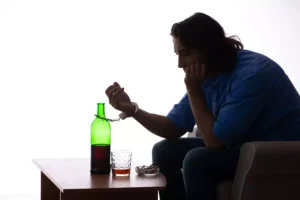
The exact thing you feel varies based on what substance you took, how much of the substance is in your body and if the substance is interacting with any other drugs or substances at the same time. There are a few different medications out there that can be used to help lessen feelings of withdrawal when someone is working to free themselves from addiction. One well-known example is methadone, which is used myths about addiction and recovery to help people overcome opioid addiction. Some people believe that addicts possess the ability to give up their substance abuse whenever they want. The idea is that, if they just exercised enough discipline and willpower, they’d be free of their addiction. Before getting into (and debunking) some of the most common addiction myths, it’s important to emphasize why falling for these myths is so dangerous.
Essential Professional and Relationship Life Skills While in Drug Rehab
- Prescription medications have the potential to be as addictive and deadly as illicit drugs.
- Sheff asserts that the reason that addiction treatments overwhelmingly fail is because of how we view addiction.
- Relapse rates for addiction are high, indicating that overcoming addiction is not as simple as just “quitting” and that ongoing support is crucial for maintaining sobriety.
The idea that willpower alone can cure addiction is dangerous, as it can lead to feelings of guilt, shame, and failure among those who struggle to maintain sobriety. It’s important to acknowledge the need for professional help and evidence-based treatments, and to support those in recovery as they navigate the challenges of overcoming addiction. The notion that an individual must hit “rock bottom” before they can begin to recover from addiction is a dangerous and misleading myth. This idea suggests that a person https://ecosoberhouse.com/ must experience severe negative consequences, such as losing their job, relationships, or health, before they will be motivated to seek help for their addiction. It’s important to understand that addiction is not a choice or a character flaw, but rather a chronic disease that alters brain chemistry and function. Recognizing addiction as a brain disorder is crucial for reducing stigma and promoting effective treatment approaches that address the underlying causes, rather than simply blaming the individual.
Rehab Doesn’t Help
The National Institute on Drug Abuse reports that as many as 30% of people who use marijuana will become addicted. If you display symptoms such as intense marijuana cravings, being unable to reduce your use, or missing work because of marijuana use, you may have an addiction to marijuana. If you are living with an addiction, it doesn’t mean you’re weak. Finding a medical treatment plan or recovery support community can help you heal. If you or a loved one is struggling with addiction, you’ve probably heard a lot of well-meaning advice from people who don’t truly understand.
#2. Addiction is a choice.
David Sack, M.D., is board certified in addiction psychiatry and addiction medicine and serves as CMO of Elements Behavioral Health and Promises Treatment Centers. It’s not just curious, misinformed teens but also their parents who minimize the problem. According to a recent survey by The Partnership at Drugfree.org, only 14 percent of parents mention prescription drugs when they talk to their kids about drugs, and one in six parents said prescription drugs are safer than street drugs. When relapse does occur, it’s essential to view it as a learning opportunity rather than a failure. How can the treatment plan be adjusted to better support the individual’s needs? These questions can help transform a setback into a stepping stone towards more robust recovery.

Heroin Addiction in Cinema: Powerful Films Exploring the Depths of Substance Abuse

These are the same circuits linked to survival, driving powerful urges no different from those driving the need to eat or drink water. While we’re firm believers in the power that comes with education and setting boundaries, we never want loved ones to feel shame or as if it’s their sole responsibility to get someone well. Not everyone will choose to get help – despite our best efforts. We’re here for you, just as we’re here for those struggling with alcohol or other drugs. That said, there’s also a lot of data about alcoholics and drug addicts that are simply wrong. Tolerance and dependence-withdrawal following chronic use; intense craving; nicotine addiction.
Additionally, the National Survey on Drug Use and Health (NSDUH) reported that 22.35 million Americans aged 18 or older are in recovery from alcohol or drug addiction. According to the National Institute on Drug Abuse (NIDA), between 40% and 60% of people with substance use disorders relapse at some point during their recovery. While these numbers may seem discouraging, it is important to note that relapse rates for addiction are similar to those for other chronic diseases, such as diabetes, asthma, and hypertension.
- Whether you are seeking care for yourself or a loved one, call us today for a free, no-obligation consultation.
- If you think you or a loved one are at risk of a substance use disorder, have an honest conversation with a healthcare provider.
- It’s like being dealt a hand in poker – some people start with a pair of aces, while others are left with a measly two and seven off-suit.
- If an intensive outpatient program is right for you, you can seek treatment without leaving home for extended periods.
- These questions can help transform a setback into a stepping stone towards more robust recovery.
Produces dose-dependent relaxation, disinhibition, mild euphoria, inebriation, intoxication, CNS depression (similar to CNS depressants), liver damage. Significant tolerance and dependence-withdrawal following chronic use; intense craving; alcoholism. Where possible, the committee drew upon published literature and previous studies. In addition, the committee sponsored a workshop focused heavily on identifying existing barriers and discussing possible strategies to overcome them (Appendix A). Participants included junior and senior researchers inside and outside the field, administrators, policymakers, and representatives of industry and private foundations (Appendix B). The workshop included two plenary lectures (Appendixes C and D).
Addiction Myth #1: People who are addicted just lack willpower.
Over time, the substances change your brain chemistry, and you become desensitized to their effects. As you seek out more of a substance, it may lead to taking dangerously harmful doses or mixing substances that can be life-threatening complications like overdose. When you take a substance, a surge of dopamine happens in your brain. Because dopamine causes you to feel good, your brain and body want more of it. Such massive dopamine levels can lead to damaging changes that affect your thoughts, feelings and behavior. This can create an unhealthy drive to seek more pleasure from the substance and less from more healthy experiences.

Successful relapse prevention plans involve the avoidance and/or management of risk factors. Also, the less severe the addiction, the more likely someone is to avoid relapse altogether. In other words, doctors were doing wonderfully, although opioid and other drug deaths continued to surge. The clear path forward based on Dr. Harris’s remarks was for physicians to redouble their efforts to curtail painkiller prescriptions.
How Science Has Revolutionized the Understanding of Drug Addiction
Some people don’t seek treatment because they don’t feel they can do it or aren’t ready to give up the substance. However, other people are blinded by myths concerning addiction that keep them from getting off drugs or alcohol. Let’s take a look at 5 addiction myths that may be holding you back. As we’ve journeyed through the labyrinth of drug addiction misconceptions, it’s clear that the path to understanding is paved with shattered myths and debunked stereotypes. We’ve seen how addiction is not a choice but a complex interplay of brain chemistry, genetics, and environment. We’ve recognized that addiction doesn’t discriminate based on the type of substance or the user’s socioeconomic status.